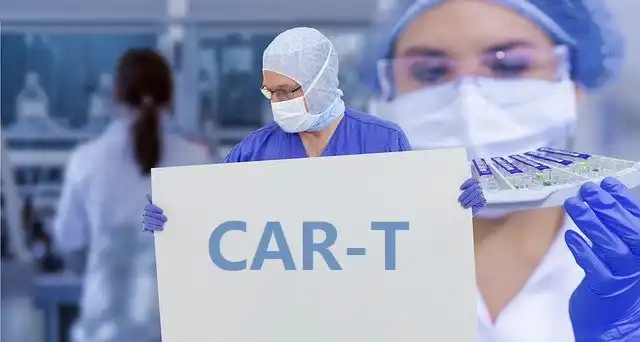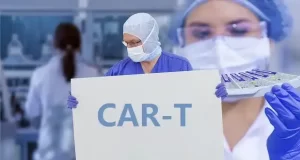Can Cytokine Modulation Enhance the Efficacy of CAR-T Cell Therapy?
- Can Cytokine Modulation Enhance the Efficacy of CAR-T Cell Therapy?
- What Are HIV-Related Cancers and How Can They Be Prevented?
- Metformin: From Diabetes Treatment to a New Approach for HIV Cure
- Advances in Research on HPV-Related Oropharyngeal Cancer and Immunotherapy
- Could mRNA Vaccines Be the Dawn of a New Era in Cancer Immunotherapy?
- Parkinson’s and Alzheimer’s Diseases May Originate in the Gut!
Can Cytokine Modulation Enhance the Efficacy of CAR-T Cell Therapy?
- Shocking! All existing AIDS vaccine developments have failed
- Sanofi Japan Data Breach: 730000 Healthcare Professionals’ Information Exposed
- CT Radiation Exposure Linked to Blood Cancer in Children and Adolescents
- FDA has mandated a top-level black box warning for all marketed CAR-T therapies
- Can people with high blood pressure eat peanuts?
- What is the difference between dopamine and dobutamine?
- How long can the patient live after heart stent surgery?
Can Cytokine Modulation Enhance the Efficacy of CAR-T Cell Therapy?
Chimeric Antigen Receptor (CAR) T-cell therapy is a promising form of adoptive immunotherapy aimed at improving outcomes for cancer patients. While CAR-T cells have demonstrated efficacy in treating hematologic malignancies, overcoming solid tumors remains a significant challenge, necessitating the enhancement of therapeutic effectiveness.
Several approaches are being explored to boost the anti-tumor activity of CAR-T cells, such as targeting multiple antigens, enhancing T-cell proliferation and persistence, improving homing to tumor sites, and developing resistance to the immunosuppressive tumor microenvironment (TME).
One promising strategy to enhance T-cell activation involves the transgenic expression of cytokines or engineered cytokine receptors. This not only enhances CAR-T cell expansion and persistence but also improves their function within the immunosuppressive TME.

CAR-T Cell Activation Signals
CARs consist of four components: an extracellular antigen recognition domain (commonly a single-chain variable fragment, scFv), structural components like hinge and transmembrane domains, co-stimulatory domains to maintain CAR-T cell effector function, and an activation domain (CD3ζ).
Physiological T-cell activation requires three distinct signals to gain effector function and form immune memory:
- Signal 1 (Activation): Antigen recognition through the T-cell receptor (TCR), mediated by CD3ζ signaling.
- Signal 2 (Co-stimulation): Additional signals from CD28 or other molecules enhance signal 1.
- Signal 3: Cytokine-mediated promotion of naive T-cell proliferation and differentiation into effector T cells.
First-generation CARs provided only signal 1 via CD3ζ, while second-generation CARs added co-stimulatory signals (signal 2) through molecules like CD28 or 4-1BB. However, repeated exposure to tumor cells can reduce cytokine production, such as IL-2, which is crucial for T-cell function. Furthermore, important cytokines like IL-12 and IL-15, which are critical for T-cell effector functions, are either expressed at low levels or not produced by T cells.
Given these limitations, researchers have begun enhancing signal 3 by constitutive and inducible cytokine expression or through engineered cytokine receptors.
Common γ-Chain Cytokines and Their Receptors
The common γ-chain cytokine receptor family includes IL-2, IL-4, IL-7, IL-9, IL-15, and IL-21, which play crucial roles in T-cell differentiation, proliferation, and homeostasis. These cytokines signal through shared receptors that include the common γ-chain (γc) and an individual receptor chain for each cytokine.
Key Cytokines in CAR-T Cell Therapy
-
IL-2 and IL-15: Both promote immune cell proliferation and transcription of anti-apoptotic proteins, but their effects vary across immune cell subsets. IL-2 enhances regulatory T cells (Tregs) and activated T cells, while IL-15 primarily benefits memory T cells and NK cells. CAR-T cells expressing IL-2 or IL-15 have shown increased anti-tumor activity, though prolonged IL-2 exposure may lead to regulatory T-cell expansion, hindering anti-tumor responses. IL-15 expression improves CAR-T cell persistence and memory cell maintenance, and membrane-bound IL-15 is being explored for improved signaling in CAR-T cells.
-
IL-7 and CCL19: IL-7 promotes T-cell expansion without significant toxicity, and transgenic expression of IL-7 in CAR-T cells enhances anti-tumor efficacy. Combining IL-7 with CCL19 has further increased CAR-T cell infiltration into tumors, leading to improved outcomes.
-
IL-21: This cytokine, activating STAT3, has been shown to improve survival rates in mouse lymphoma models by maintaining less-differentiated effector memory T cells. IL-21 enhances long-term CAR-T cell persistence, a key factor in successful therapy.
Engineered Cytokine Receptors
Engineering cytokine receptors, such as constitutively active IL-7 receptors, provides continuous activation signals to CAR-T cells. Such strategies have shown enhanced anti-tumor activity in both in vitro and in vivo models. Chimeric cytokine receptors that convert suppressive signals from the TME into pro-proliferative signals are also being investigated, improving CAR-T cell resilience in hostile tumor environments.
IL-12 Family Cytokines
IL-12, a pro-inflammatory cytokine, has shown promise in preclinical models but presents toxicity challenges in clinical settings. CAR-T cells expressing IL-12 have demonstrated enhanced persistence and tumor-killing abilities by modulating immune-suppressive cells within the TME. Controlled expression of IL-12 through NFAT-promoters is currently under clinical investigation to minimize toxicity while maintaining efficacy.
Conclusion
Transgenic cytokines and engineered cytokine receptors offer exciting avenues to boost CAR-T cell therapy by enhancing anti-tumor activity, modulating the TME, and inducing tumor-specific immune responses.
However, the risk of cytokine release syndrome (CRS) and dose-limiting toxicity must be carefully balanced with the therapeutic benefits.
As research progresses, these innovations hold the potential to make CAR-T cell therapy more effective, especially for solid tumors.
Can Cytokine Modulation Enhance the Efficacy of CAR-T Cell Therapy?
Reference:
1. Engineered Cytokine Signaling to Improve CAR T CellEffector Function. Front Immunol. 2021; 12: 684642.
(source:internet, reference only)
Disclaimer of medicaltrend.org
Important Note: The information provided is for informational purposes only and should not be considered as medical advice.



